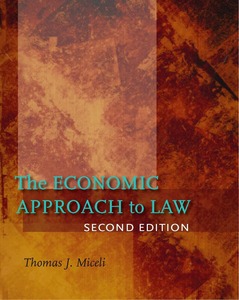Chapter 3
MacPherson v. Buick Motor Co.
Court of Appeals of New York
217 N.Y. 382, 111 N.E. 1050 (1916)
Cardozo, J. The defendant is a manufacturer of automobiles. It sold an automobile to a retail dealer. The retail dealer resold to the plaintiff. While the plaintiff was in the car it suddenly collapsed. He was thrown out and injured. One of the wheels was made of defective wood, and its spokes crumbled into fragments. The wheel was not made by the defendant; it was bought from another manufacturer. There is evidence, however, that its defect could have been discovered by reasonable inspection, and that inspection was omitted. There is no claim that the defendant knew of the defect and willfully concealed it. The charge is one, not of fraud, but of negligence. The question to be determined is whether the defendant owed a duty of care and vigilance to any one but the immediate purchaser.
If the nature of a thing is such that it is reasonably certain to place life and limb in peril when negligently made, it is then a thing of danger. Its nature gives warning of the consequences to be expected. If to the element of danger there is added knowledge that the thing will be used by persons other that the purchaser, and used without new tests, then, irrespective of contract, the manufacturer of this thing of danger is under a duty to make it carefully. That is as far as we are required to go for the decision of this case. There must be knowledge of a danger, not merely possible, but probable. It is possible to use almost anything in a way that will make it dangerous if defective. That is not enough to charge the manufacturer with a duty independent of his contract. There must also be knowledge that in the usual course of events the danger will be shared by others than the buyer. Such knowledge may often be inferred from the nature of the transaction.
There is nothing anomalous in a rule which imposes upon A., who has contracted with B., a duty to C. and D. and others according as he knows or does not know that the subject-matter of the contract is intended for their use.
In this view of the defendant’s liability there is nothing inconsistent with the theory of liability on which the case was tried. It is true that the court told the jury that “an automobile is not an inherently dangerous vehicle.” The meaning, however, is made plain by the context. The meaning is that danger is not to be expected when the vehicle is well constructed.
We think the defendant was not absolved from a duty of inspection because it bought the wheels from a reputable manufacturer. It was not merely a dealer in automobiles. It was a manufacture of automobiles. It was responsible for the finished product. It was not at liberty to put the finished product on the market without subjecting the component parts to ordinary and simple tests.
Willard Bartless, C.J. (dissenting). I think that [this case extends] the liability of the vendor of a manufactured article further than any case which has yet received the sanction of this court. It has heretofore been held in this state that the liability of the vendor of a manufactured article for negligence arising out of the existence of defects therein does not extend to strangers injured in consequence of such defects, but is confined to the immediate vendee. The exceptions to this general rule, which have thus far been recognized in New York are cases in which the article sold was of such a character that danger to life or limb was involved in the ordinary use thereof; in other words, where the article sold was inherently dangerous. As has already been pointed out, the learned trial judge instructed the jury that an automobile is not an inherently dangerous vehicle.
I do not see how we can uphold the judgment in the present case without overruling what has been so often said by this court and other courts of like authority in reference to the absence of any liability for negligence on the part of the original vendor to any one except his immediate vendee. The absence of such liability was the very point actually decided in the English case of Winterbottom v. Wright[If this law has become archaic and needs to be changed,] the change should be effected by the Legislature and not by the courts.
